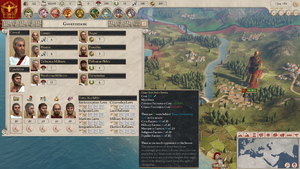| 本文是一篇小作品,这表明它尚未充分涵盖其主题。 请帮助我们扩充本文的内容。 |
Each country in Imperator: Rome is ruled by a government of a specific type.
Ranking
Each country in Imperator: Rome has one of the four rankings, which can change depending on the circumstances. The following are:
City State
This is only possible if your country is only 1 city large. A City State can be a part of a defensive league, and have the following bonuses.
- +20% Commerce Income
- +20% Defensiveness
- +1 Diplomatic Relation
Local Power
These are countries that have less than 10 cities. Local Powers can be part of defensive leagues, and they have the following bonuses.
- +2 Diplomatic Relation
Major Power
These are countries that have at least 10 cities. They can use the diplomatic abilities Threaten War and Guarantee, and they have the following bonuses.
- +3 Diplomatic Relation
- +1 Trade Route in Capital
- +1 of each Power for matching Ideas to Government Form for a total of +2.
Great Power
These are countries with at least 20 provinces, and that are not subjects of other nations. They can use the diplomatic abilities Intervene in War, Enforce Peace, Threaten War and Guarantee, and they have the following bonuses.
- +5 Diplomatic Relation
- +2 Trade Route in Capital
- +2 of each Power for matching Ideas to Government Form for a total of +3.
Government Types
Each country has a government type, which regulates how its internal politics work.
Republics
The Senate
- 主条目:Politics
The Senate, in a republic, has 100 seats, and each seat belongs to one of five factions. Every adult character in a republic has a predilection to each faction, and is supportive of one. Each faction has a leader, generally the most prominent character that supports that faction.
Depending on which faction the ruler of the republic belongs to, the republic gets various bonuses or maluses. The amount of seats in the senate changes over time, depending on different factors, with the charisma of the faction leader always impacting the attraction of the seats. If a nation wishes to instantly strengthen a faction's position in the senate, it can spend oratory power to convince 10 seats to join that faction. Doing so however, results in an increase of tyranny.
Senatorial factions
| Faction | Modifiers |
|---|---|
| Civic | +25% tax income, -10% building cost, -10% building construction speed |
| Military | +25% land morale, +25% naval morale |
| Mercantile | +25% commerce income, +5 diplomatic reputation |
| Religious | +10% omen duration, -33% religious conversion cost |
| Populist | +10% power costs |
Actions
There are three different categories of actions which require senate approval:
- All changing of laws require approval by the senate
- A lot of character interactions, like banishing, imprisoning, etc.
- All diplomatic interactions with other nations.
The senate can block an action if less than 40 senators support it. If less than 60 senators back the action, it can be forced through, but it will increase the amount of tyranny. If the Senate approves an action or not depends on its composition, and what the nation's course is. When an action is passed, it impacts the characters of the nation. Loyalty is lost or gained depending on faction membership, and factions gain and lose senators.
Offices
- 主条目:Politics#Offices
| Office | Modifiers |
|---|---|
| Censor | Each Charisma gives +0.2 Senate Influence for the Censor’s party. |
| Praetor | Each Charisma gives +1% Commerce Income. |
| Tribunus Militum | Each Martial gives +1% Discipline |
| Praefectus Militaris | Each Martial gives +1% Tax Income |
| Augur | Each Zeal gives +5% Omen Power |
| Pontifex | Each Zeal reduces stability cost by 2% |
| Tribunus Plebis | Each Finesse increases freemen happyness by 1% |
| Vulnerarius | Each finesse increases health by 0.5 |

